Although most young Americans consider higher education essential, their skepticism is now growing as they start doubting college’s relevance, given its cost, the debt it brings, and the alternative paths available to them in the market.
Key points:
- 83% of Gen Z call college “important” according to the data from the Gallup and Walton Family Foundation-State of American Youth Survey.
- However, these numbers are far from the Business Insider/YouGov findings that indicate only 39% of Gen Z see higher education as worth gaining.
- At the same time, Gallup notes that younger generations aren’t as confident in college degrees as they were ten years ago: from 57% in 2015 to 36% in 2023.
Many young Americans still see college as valuable, but their confidence is wavering now because of several factors.
In a 2023 Gallup survey, 83% of Gen Z (ages 12–26) said a college degree was “very” or “fairly” important, even though overall public confidence in colleges had dropped (only 36% trusted higher ed a “great deal” in 2023, down 21 points since 2015).
Other surveys paint a more skeptical picture:
As Business Insider found in late 2023, only 39% of adult Gen Z respondents saw advancing their education as essential, while 46% said college wasn’t worth the cost. Such mixed and rather controversial results suggest Gen Z values college more than it did a decade ago, yet their concerns about debt and relevance continue to grow.
The following research examines the latest data and trends in the niche to reveal all the contexts influencing such mixed views and shifting perceptions of higher education among Gen Z. We’ll start with a historical perspective and some economic context, compare the differences in attitudes to higher education among different generations, and see how the availability of alternative pathways and changing career goals shape Gen Z’s perception of college degrees.
Historical perspective: College as a ticket to the middle class
For much of the 20th century, society saw a four-year degree as the “surest ticket to the middle class,” as famously noted by President Obama back in 2013. Indeed, most regarded college completion as a path to financial mobility:
Back then, policymakers spent millions to support this approach, and employers made the possession of an academic degree (a diploma) the default credential for hiring. Young people associated many benefits, like greater income and long-term wealth, with receiving a college degree.
Yet, educational opportunities have always been uneven.
Decades of research show the college premium was the prerogative of the already advantaged:
Only 9% of young Americans from the lowest income section earned a bachelor’s degree, compared to 54% from the top section. In practice, this means that many wealthy families have disproportionately benefited economically from higher education, calling into question whether it remains a true equalizer.
Experts also note that this mantra about higher education as “the ticket to wealth” has frayed today as access and costs have shifted. Gen Z wants and seeks other educational opportunities besides college: Many prefer post-school learning experiences of two years instead of the traditional four, or sometimes even seeking non-college career pathways with a focus on earning practical skills instead of a college degree.
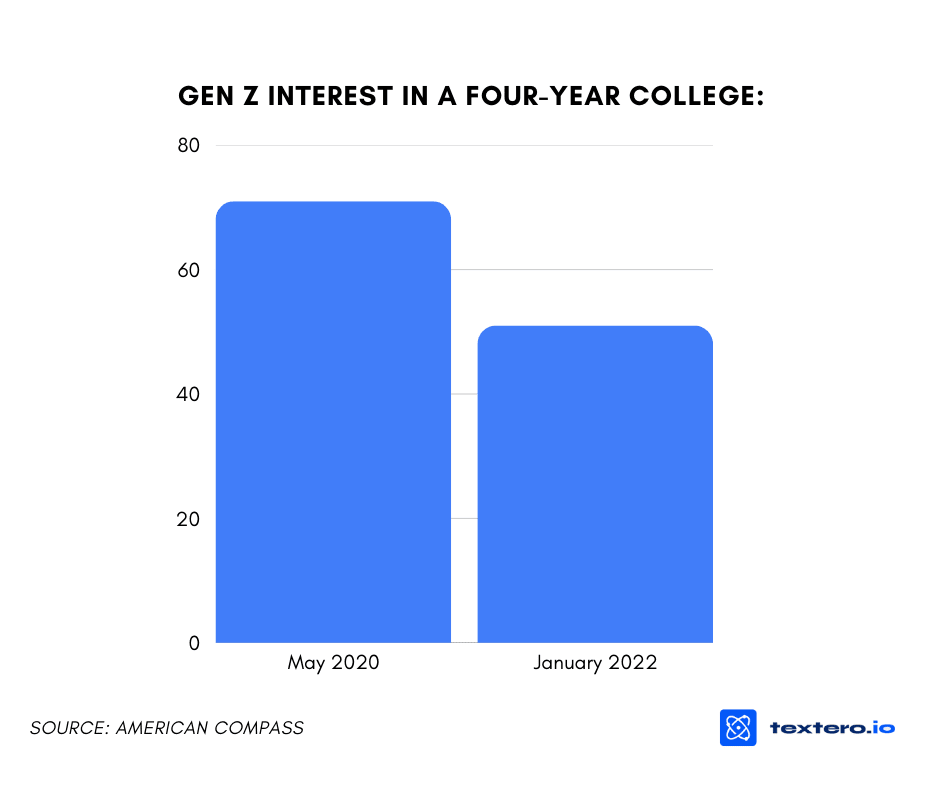
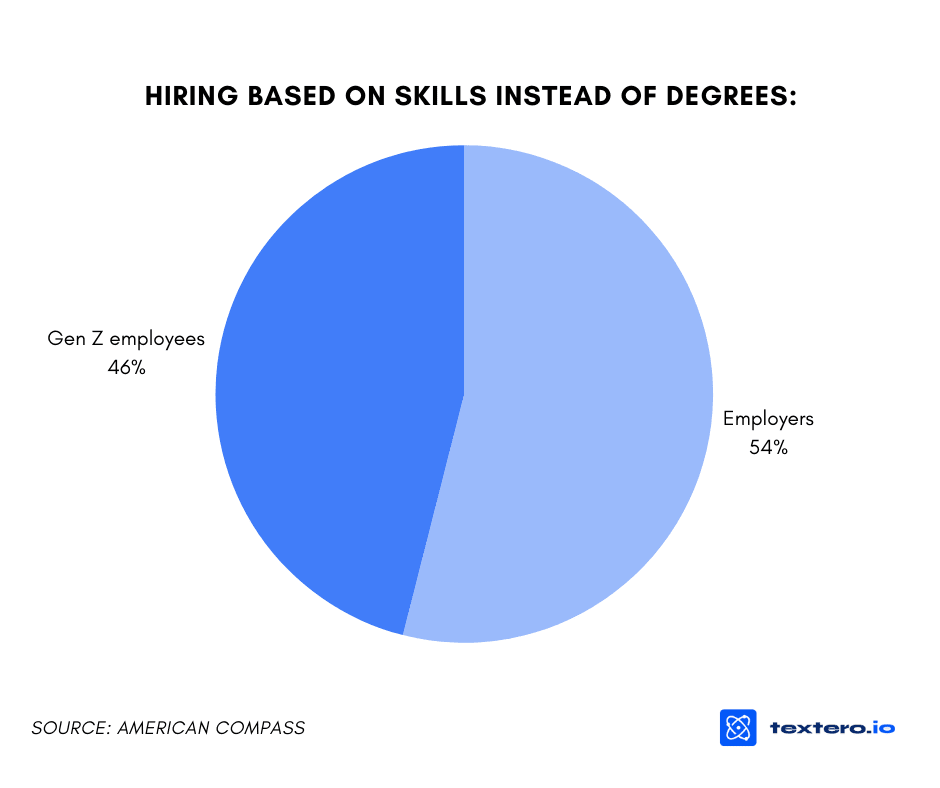
Economic context: Tuition growth, the student debt crisis, and ROI
Gen Z representatives question the cost of higher education today, doubting whether it’s worth paying so much for a degree.
College has become vastly more expensive even as its payoff is under scrutiny. Tuition and fees have surged far above inflation: Between 2010 and 2023, average in-state public 4‑year tuition rose 36.7% (an annual inflation rate of 2.64%).
Federal student loan debt has also ballooned:
As of late 2023, about 43 million Americans held roughly $1.6 trillion in federal loans, more than double the total two decades earlier. Each borrower’s balance has grown, too (the average having risen by 39% from 2008 to 2022).
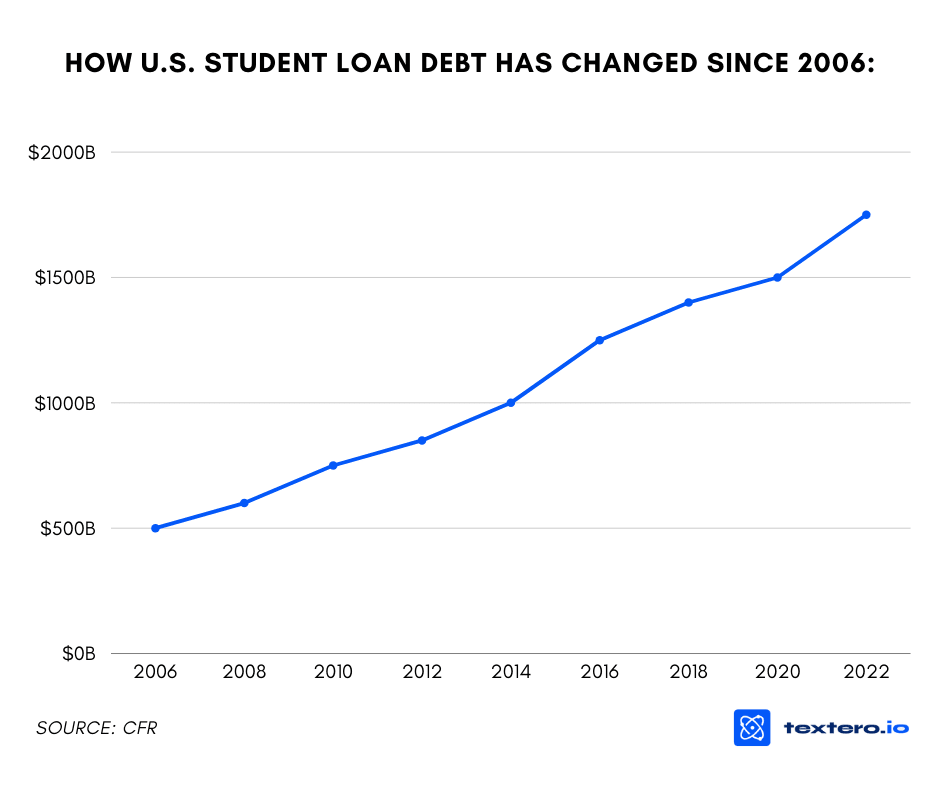
These costs have raised questions about higher education’s return on investment:
While Gen Z values colleges, they have concerns about their affordability and ROI.
On average, college graduates still out-earn non-graduates: BLS data shows median weekly earnings of $1,543 for workers with a BA vs $930 for those with only a high school diploma (roughly a 66% boost). But researchers note the income gap has narrowed somewhat as debt loads and alternative income streams rise.
Given that, young Americans more and more often change their career goals from a traditional “college-office” scheme to alternative options that won’t require massive capital investments with subsequent years of debt repayment.
Gen Z vs. Millennials, Gen X, and Boomers
Key points:
- 57% of Gen Z (age 18–21) entered college in 2018, compared with 52% of Millennials in 2003.
- Only 74% of Gen Z (age 13-17) plan to go to college, compared with 85% of Millennials.
- Black/Hispanic Gen Z representatives see college as more important (85–87%) than white Gen Z (81%).
The thoughts of Gen Z on college degrees and their influence on their success differ from those of older generations.
However, their educational level is higher:
According to the Pew report, 57% of 18–21-year-old Americans entered college in 2018, compared with 52% of Millennials at the same age and 43% of Gen Xers.
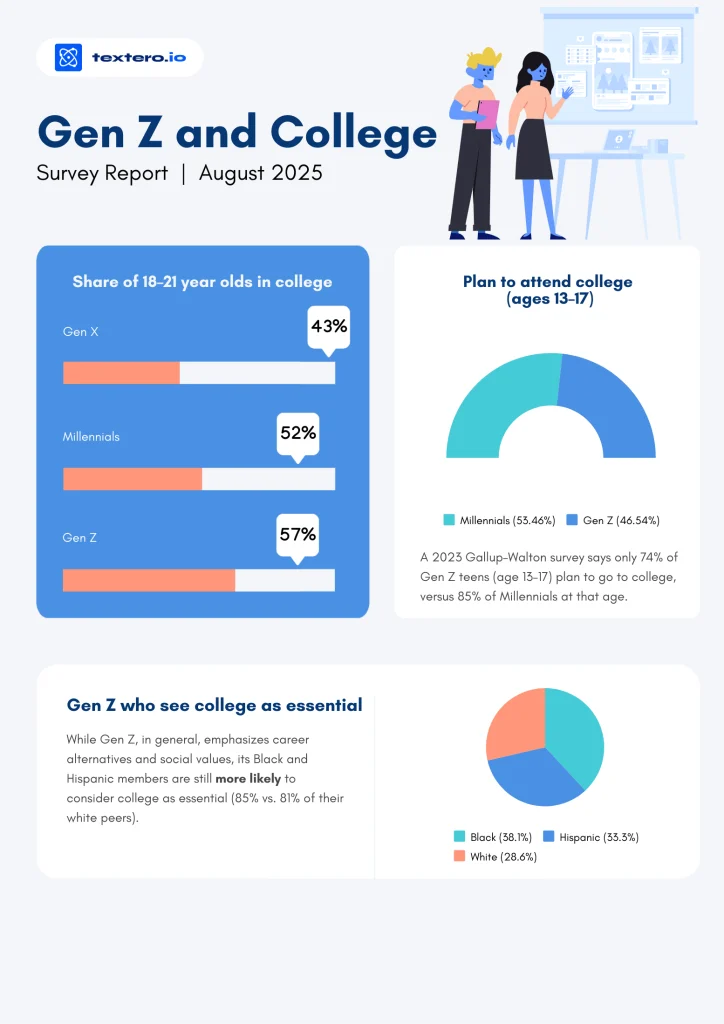
And yet, fewer Gen Z teenagers today plan to go to college than Millennials did:
A 2023 Gallup–Walton survey says only 74% of Gen Z teens (age 13–17) plan to go to college, versus 85% of Millennials at that age.
This new generation leans further left and is more diverse than their predecessors. For example, they are the first generation where the majority is non-white.
These shifts affect college decisions, too:
While Gen Z, in general, emphasizes career alternatives and social values, its Black and Hispanic members are still more likely to consider college as essential (85% vs. 81% of their white peers).
Alternative pathways: Vocational training, online certifications, self-learning
The high costs of college or university make young people explore alternative options when pursuing a profession.
In U.S. high schools, career and technical education (CTE) programs are popular: Federal data show that over 80% of graduates had earned at least one career-education credit by 2019. Those who pursue CTE in high school are more likely to complete an associate’s degree (14% vs 9%), and states are expanding these pathways — in 2023, almost every state passed new career-education laws to strengthen school–industry ties.
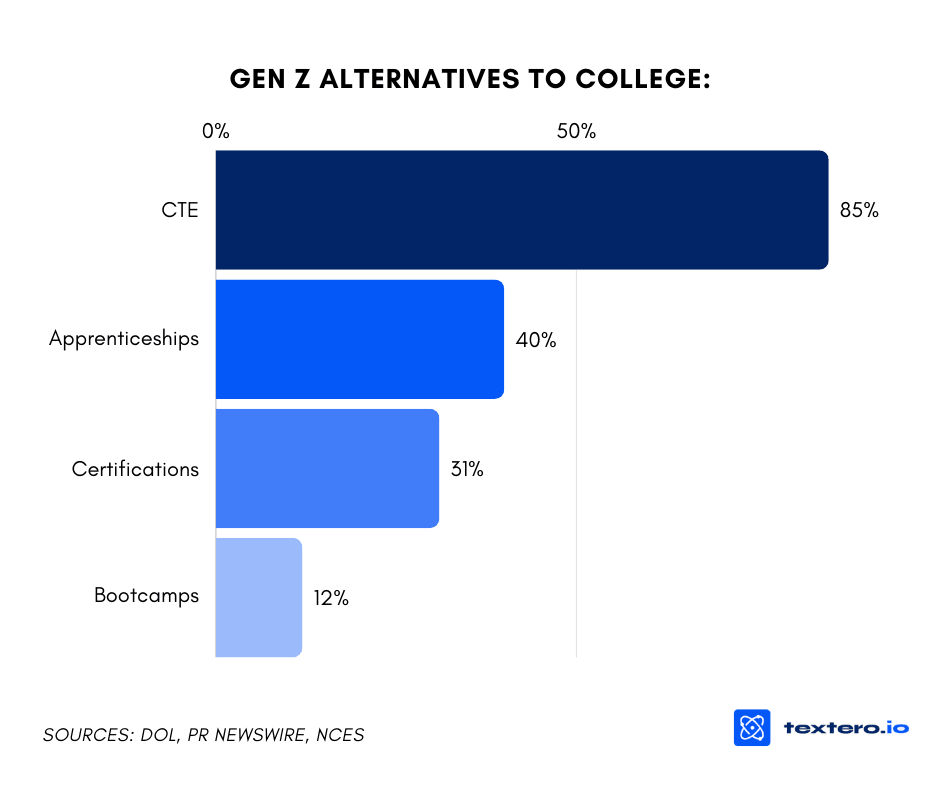
Registered apprenticeships have also grown:
About 940,000 U.S. workers participated in apprenticeship programs in FY2024, earning valuable credentials (GAO reports graduates averaged ~$80,000/year initially). Online microcredentials and bootcamps are another trend, though data is still emerging.
The wide range of opportunities for youngsters to step on a career path and start earning money without spending years on college and debt repayment influences attitudes towards higher education degrees, too. More than that, Gen Z doesn’t see college as a must-have ingredient for their happy life and well-being.
Their priorities and values are changing.
How social values and career goals are changing
Key points:
- 89% of Gen Z say purpose/meaning is important to their job satisfaction.
- Only 6% name leadership as their top career goal.
- Gen Z trusts teachers (63%) and science (71%) much more than tech firms or media.
Gen Z often prioritizes work-life balance, purpose, and social impact more than climbing the corporate ladder.
A recent Deloitte survey finds money, meaning, and well-being to be “tightly interconnected” for Gen Z; about 90% say they need to have a sense of purpose for job satisfaction. Only 6% of Gen Z consider reaching a leadership position to be their primary career goal.
Instead, many emphasize learning opportunities and balance. Gen Z is diverse and progressive when it comes to values: Thus, 63% express high confidence in teachers and 71% in science, much higher than their belief in traditional institutions like tech firms or news media (16%).
Authenticity, inclusion, social justice, community engagement, and mental health are among the top priorities for Gen Z. They choose learning and job opportunities accordingly, emphasizing things other than mere monetary rewards.
As opposed to older workers, Gen Z is more likely to have individual jobs or multiple jobs. They don’t see their financial insecurity ending and thus don’t consider a stable, many-years-at-one-place career an option worth spending their resources on. They are in favor of professional development, but only when it brings work-life balance and allows them to communicate their values and engage in interactive experiences.
In short, this generation combines pragmatism (like affordability) with their social expectations (like mental health, sustainability, or social responsibility) when deciding on their education and career paths.
What does this mean for the future of higher education?
As we see from all the above data and emerging trends, college remains a traditional path for many Gen Z. Nevertheless, educational institutions need to adapt. Rising tuition and debt pressures are driving students to demand more value, flexibility, and financial support from colleges.
At the same time, practical skills and experiences are becoming more essential for employers than the mere fact of having a diploma.
If these trends continue, higher education will have to consider and offer alternative options to meet Gen Z’s needs. These offerings may include employer partnerships, competency-based credits, the expansion of high-quality short-term programs, etc.
The coming decade could see a more pluralistic system where a variety of pathways into stable middle-class jobs complement traditional degrees.

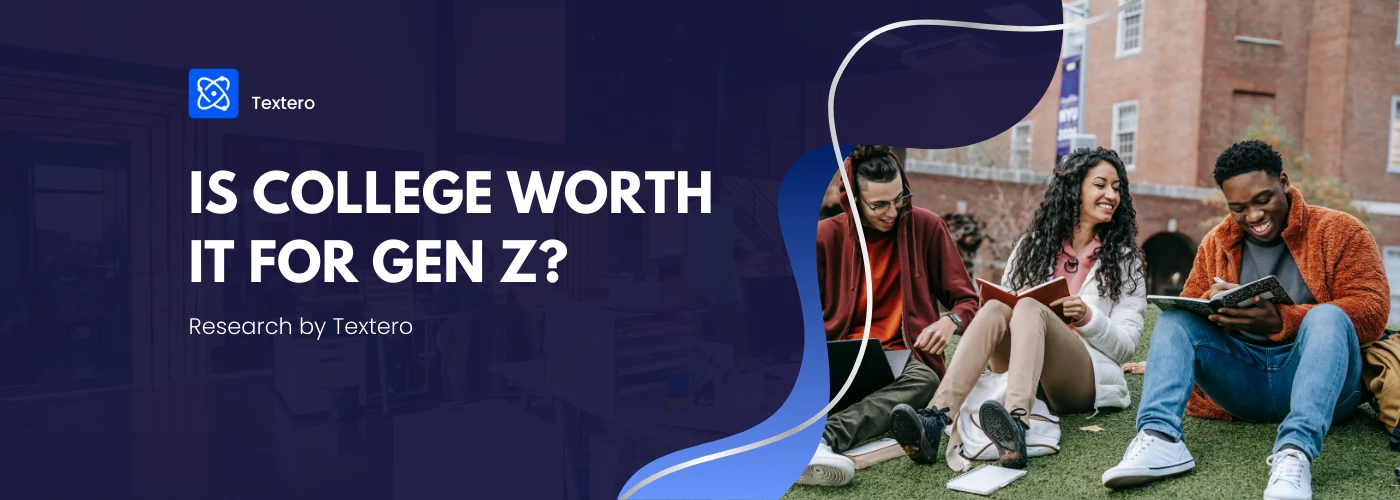



 Built-in AI detector
Built-in AI detector